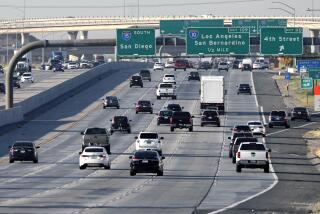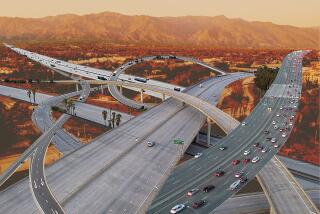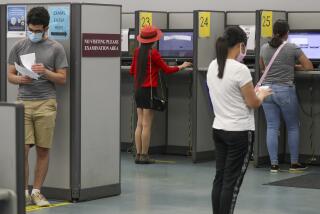Turn Away From Selfish Behavior: Use Your Signal
- Share via
There is a turn signal syndrome in California that raises questions about our culture: By a conservative estimates, 20% to 25% of California drivers have stopped using their turn signals. This behavior is dangerous. At stop lights when the car ahead does not signal a turn, one assumes it is going straight and therefore will move when the light changes. But the nonsignaling driver does not move, waiting to turn, and a rear-end accident is not unlikely.
Beyond the direct physical danger, there is the related frustration and anger. One stays in the left lane on a busy street, expecting to proceed when the light changes, but then finds that the car ahead does not budge because its nonsignaling driver plans to turn. The driver behind gets frustrated, maybe angry.
More significant than the danger or frustration this behavior promotes is the attitude behind it. Why have so many drivers stopped using this painless, easy procedure, which requires only one second and one finger, and cancels itself automatically after the turn?
The answer resides in a declining sense of community and mutuality among a large number of Americans. People have stopped using turn signals because they really don’t care about other people; they don’t find others worthy of even so simple an act as signaling a turn. And it is this attitude that changes a somewhat dangerous and selfish driving behavior into a much more significant phenomenon.
This is reified by related driving behaviors that have also become more common in recent years. Time and again, drivers who find themselves in the wrong lane deal with the problem by refusing to take any responsibility--or consequences--for their actions. They simply sit there, holding up sometimes long lines of traffic, until they can go in the direction they originally intended. The idea of following the signals and going a block or two out of one’s way doesn’t occur; taking responsibility for one’s actions seems pointless just to avoid discommoding other people.
These behaviors are by no means confined to driving. But we see them there because we are all on the road so much, because driving in California can be difficult and frustrating, and because the impact on others can be so broad and direct.
But the failure to signal turns, such a simple little thing, is symptomatic of one of the more unpleasant, selfish and antisocial trends in California life. It ought to be taken seriously.






